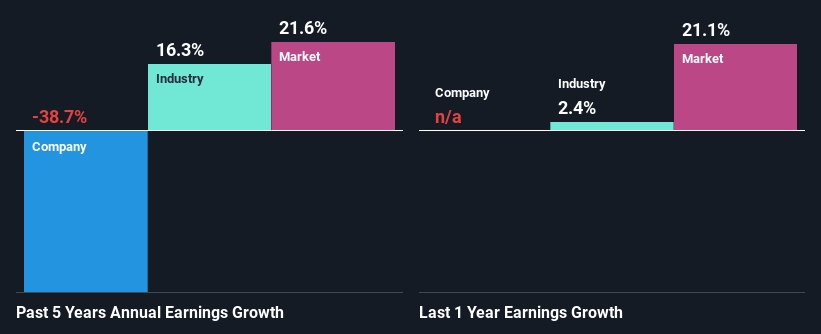Mangalam Organics Limited (NSE:MANORG) Stock Is Going Strong But Fundamentals Look Uncertain: What Lies Ahead ?

Mangalam Organics (NSE:MANORG) has had a great run on the share market with its stock up by a significant 36% over the last three months. However, we wonder if the company's inconsistent financials would have any adverse impact on the current share price momentum. Particularly, we will be paying attention to Mangalam Organics' ROE today.
ROE or return on equity is a useful tool to assess how effectively a company can generate returns on the investment it received from its shareholders. In short, ROE shows the profit each dollar generates with respect to its shareholder investments.
See our latest analysis for Mangalam Organics
How Is ROE Calculated?
The formula for ROE is:
Return on Equity = Net Profit (from continuing operations) ÷ Shareholders' Equity
So, based on the above formula, the ROE for Mangalam Organics is:
1.5% = ₹43m ÷ ₹2.8b (Based on the trailing twelve months to March 2024).
The 'return' is the profit over the last twelve months. One way to conceptualize this is that for each ₹1 of shareholders' capital it has, the company made ₹0.02 in profit.
What Is The Relationship Between ROE And Earnings Growth?
So far, we've learned that ROE is a measure of a company's profitability. We now need to evaluate how much profit the company reinvests or "retains" for future growth which then gives us an idea about the growth potential of the company. Assuming all else is equal, companies that have both a higher return on equity and higher profit retention are usually the ones that have a higher growth rate when compared to companies that don't have the same features.
Mangalam Organics' Earnings Growth And 1.5% ROE
As you can see, Mangalam Organics' ROE looks pretty weak. Not just that, even compared to the industry average of 10%, the company's ROE is entirely unremarkable. Therefore, it might not be wrong to say that the five year net income decline of 39% seen by Mangalam Organics was possibly a result of it having a lower ROE. We reckon that there could also be other factors at play here. For example, the business has allocated capital poorly, or that the company has a very high payout ratio.
However, when we compared Mangalam Organics' growth with the industry we found that while the company's earnings have been shrinking, the industry has seen an earnings growth of 16% in the same period. This is quite worrisome.

The basis for attaching value to a company is, to a great extent, tied to its earnings growth. The investor should try to establish if the expected growth or decline in earnings, whichever the case may be, is priced in. By doing so, they will have an idea if the stock is headed into clear blue waters or if swampy waters await. If you're wondering about Mangalam Organics''s valuation, check out this gauge of its price-to-earnings ratio, as compared to its industry.
Is Mangalam Organics Making Efficient Use Of Its Profits?
Mangalam Organics' low three-year median payout ratio of 1.4% (implying that it retains the remaining 99% of its profits) comes as a surprise when you pair it with the shrinking earnings. This typically shouldn't be the case when a company is retaining most of its earnings. So there could be some other explanations in that regard. For example, the company's business may be deteriorating.
In addition, Mangalam Organics has been paying dividends over a period of six years suggesting that keeping up dividend payments is preferred by the management even though earnings have been in decline.
Conclusion
Overall, we have mixed feelings about Mangalam Organics. While the company does have a high rate of reinvestment, the low ROE means that all that reinvestment is not reaping any benefit to its investors, and moreover, its having a negative impact on the earnings growth. Wrapping up, we would proceed with caution with this company and one way of doing that would be to look at the risk profile of the business. Our risks dashboard would have the 4 risks we have identified for Mangalam Organics.
New: Manage All Your Stock Portfolios in One Place
We've created the ultimate portfolio companion for stock investors, and it's free.
• Connect an unlimited number of Portfolios and see your total in one currency
• Be alerted to new Warning Signs or Risks via email or mobile
• Track the Fair Value of your stocks
Have feedback on this article? Concerned about the content? Get in touch with us directly. Alternatively, email editorial-team (at) simplywallst.com.
This article by Simply Wall St is general in nature. We provide commentary based on historical data and analyst forecasts only using an unbiased methodology and our articles are not intended to be financial advice. It does not constitute a recommendation to buy or sell any stock, and does not take account of your objectives, or your financial situation. We aim to bring you long-term focused analysis driven by fundamental data. Note that our analysis may not factor in the latest price-sensitive company announcements or qualitative material. Simply Wall St has no position in any stocks mentioned.
Have feedback on this article? Concerned about the content? Get in touch with us directly. Alternatively, email editorial-team@simplywallst.com
About NSEI:MANORG
Mangalam Organics
Manufactures and sells chemicals in India and internationally.
Proven track record low.
Market Insights
Community Narratives



